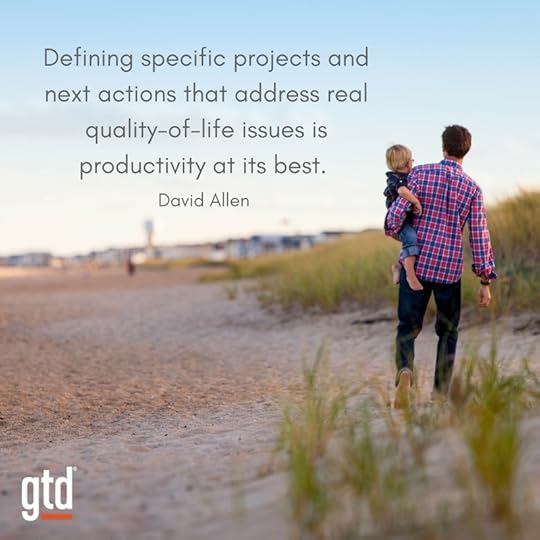David Allen's Blog, page 51
September 15, 2016
Are you indulging in easy?
 GTD® wisdom from David Allen on giving yourself the gift of easy and unplanned
GTD® wisdom from David Allen on giving yourself the gift of easy and unplanned
Things being simple and easy is not easy, for most of us.
The structure of planning what to do and working within structure can be stressful, if not stifling, unless it’s balanced with the unplanned and unstructured.
I relish those spontaneous times when I decide to stroll with my wife and dog through the park near our home in Amsterdam. Or when I take time to read a novel for fun. Or when I stop for a lovely glass of wine along an outdoor cafe along the canal because it seems like the thing to do. How about just taking time to take time?
Ah, the infinite moments to enjoy, presented to us on the conveyor belt of our existence….
There are times when making no sense makes sense. Just being, hanging out, following the whim, the momentary inclination. How long can you indulge yourself, though, purely, without hesitation, doubt, or a troubled thought about what it should be troubled about…?
Stop! Do something else. Do nothing. Try it. Anything. It’s not about our doing. We merely do to be about what we’re really about. But what we’re really about is about much more than any of that. And much more fun. We have to give up our boundaries to reach into the real priorities.
–David Allen
This article appeared in David’s monthly Productive Living newsletter. Subscribe for free.
September 6, 2016
Episode #21 – Optimizing Your GTD System
How do you leverage procedures and tools for better outcomes? David Allen presents a webinar on how to optimize your GTD system, so that you have the information you need to be productive, when you need it. Includes Q&A’s from webinar participants.
Listen Now
Subscribe or Download
August 31, 2016
Are you micromanaging your mind?

GTD® wisdom from David Allen on trusting your system and getting to the place where you are truly thinking about things, not of them.
One of the greatest traps in growing a business is also a pitfall for self management: if you don’t trust your system, you can’t let go of operational details and you’ll limit your ability to create at a bigger level.
Many successful entrepreneurs I have worked with over the years could be characterized (and have been, by their employees and friends) as “highly creative control freaks.” It’s understandable because usually it takes that kind of strong, directed energy to create a business, to make something out of nothing. Much like a parent will go to superhuman lengths to protect its vulnerable offspring, someone who gives birth to an enterprise almost of necessity must have skin as thick as an elephant’s and the aggressive/ defensive capacity of a samurai warrior. It takes tremendous focus, determination, and, yes, a certain lack of sensitivity, to create something new and get it to stick around in this world.
That protectionism can, of course, become their undoing. In order to continue in their visionary capacity to grow and expand, they must mature not only their team and their systems but themselves as well, to prevent the strangulation of micro-management. They have to trust. But trust is not something you can just do because you should. I suppose you can develop a greater sense of overall optimism about life, but you don’t merely learn to trust—you learn to build trust. And you do that by creating a system and working it, so you can let go at that lower functional level, without letting go of the bigger picture of what you’re trying to accomplish.
A beginner at the wheel of a car will have jerky, small movements. They are maintaining control, just at small increments of focus. Only as they learn to trust the car’s responsiveness can they let go on that level, extend their horizon, and cruise at higher speeds more easily.
Similarly, if you don’t fully trust your personal systems, you are likely to be dedicating inappropriate and unnecessary mental attention to details and content, often with a resultant negative emotional component. You’ll feel pulled, overwhelmed, and often like you’re close to losing control.
But you can’t trust your system until it’s trust-worthy. When is that? When you know you have captured all your commitments, clarified what you’re intending to do about them, decided the actions you need to take about them, and have parked reminders of those actions in places that you know you’ll look, where and when you need to.
Entrepreneurs have to break out of their comfort zone of operational control and let go, getting good people in the right places, accountable for the right things and monitored appropriately. Similarly, to keep a clear head focused creatively at the right things, you must have all the right things in your personal system and the behaviors to look at them at the right time. If you try to keep more than ten things in your mind at once, you’ll lose objectivity about their relationships with each other. Less important things will bother you more than they should, and you won’t give the tactical and strategic stuff the objective attention it deserves. And if some part of you knows that you don’t have everything captured and organized in the right place, your brain simply won’t let go of some attention to unseen details. You’ll find yourself still to some degree at the mercy of the latest and loudest. It’s the price paid for staying in the comfort zone of keeping control of it all in your head.
When people begin to implement the Getting Things Done® methods, they initially experience a rush of energy and creativity, while feeling more relaxed at the same time. But those positive experiences can slip away quickly without the confidence that the content of their systems are complete and current (the inventory of which could have been changed and expanded hugely with the last phone call).
People have often said, “I have everything captured in the system, but my mind is still worrying and reminding me about this and that.” My question is, “How long have you been working your system?” Usually they have only recently set it up. That won’t be sufficient to build trust yet, and your mind will still try to keep control. That’s why the challenge is to keep going—to keep coming back to everything downloaded, processed, and organized. And the trick is to come back often enough for the mind to be able to let go, trusting that remembering and reminding is really being handled by something better than it is. Then you’re truly free to be thinking about things, not of them.
–David Allen
August 18, 2016
Episode #20 – Defining Your Areas of Focus
A key to trusting your priorities is knowing your roles, areas to maintain, oversee, and manage—personally and professionally. In this webinar, Senior GTD® Coaches Meg Edwards and Kelly Forrister walk you through developing the Areas of Focus level in the GTD Horizons of Focus® model, giving you examples, best practices, and tips for developing and refining your own.
Listen Now
Subscribe or Download
August 16, 2016
August 11, 2016
Let’s hear it for lazy!
 I am the laziest person I’ve ever met.
I am the laziest person I’ve ever met.
I often admit to that in my courses, and lots of people think that’s the silliest thing they’ve ever heard—they see me as highly focused and productive. But to me “lazy” just means making something happen with as little effort as possible. Perhaps it is equally true that I’m the most efficient person I’ve ever met. I seem to have made it part of my life’s work to find out with how little activity I can get a result.
When I’m processing my email inbox, I know the shortcut keys to get the action tracked and the email organized with as few keystrokes as possible. When I leave for the airport, I rush to leave the house by a certain time, so that I don’t have to rush later on the freeway or at the airport, when there’s much more pressure.
So, this is not unusual for most of us, and I’m sure we’ve all created our own shortcuts in life, especially for repetitive tasks. What might be a new frontier for most people to be conscious of is getting lazy/efficient about thinking. My organization system is set up to prevent ever having a thought twice! I capture thoughts when I have them, so I don’t have to have them again. I only put things on my calendar that have to get done that day, so I don’t have to keep rethinking what’s on the page when I look at it. I have an “at computer online” list of actions, separate from my “at computer” list, so when I’m working on my laptop on a plane or train that doesn’t have WiFi, I don’t have to keep rethinking which items on the list I can do, and which I can’t. I decide the next action step on my projects and keep those current, so I don’t have to keep thinking, “What should I be doing to make this happen?” I review the projects and areas of interest and focus of my life once a week, so that I don’t have to keep thinking that I should be thinking about them.
I was not born very organized, and it’s not something I do for its own sake. I have just worked pretty hard at not having to work hard. There are better things to do.
–David Allen
August 9, 2016
The power of the Weekly Review
 We saw this post on Facebook by Matt Rapport, a full-time musician
from Michigan. We love hearing how GTD is working for people and he was happy to let us share his post with our readers:
We saw this post on Facebook by Matt Rapport, a full-time musician
from Michigan. We love hearing how GTD is working for people and he was happy to let us share his post with our readers:
I continue to be amazed at the power of Getting Things Done’s Weekly Review. I woke up this morning with my head spinning. With my Weekly Review done, my inbox (email and physical) are at zero, my calendar is scheduled with important priorities, and my next actions lists are updated. Most importantly, my head is clear and I feel energized headed into the weekend and next week!
August 3, 2016
Quieting the Noise of Your Life
 Over the years many people have reported “transformational” experiences in working with the Getting Things Done® methodology. I have seen people lose pounds in just a few days, their faces brighten, their countenance and attitude swing way to the positive, and even make tremendous shifts in how they think and work for the rest of their lives.
Over the years many people have reported “transformational” experiences in working with the Getting Things Done® methodology. I have seen people lose pounds in just a few days, their faces brighten, their countenance and attitude swing way to the positive, and even make tremendous shifts in how they think and work for the rest of their lives.
That is certainly rewarding feedback and testimony to the validity of the methodology. Many people consequently tend to think that there is something mystical and even “spiritual” about it. Here’s my perspective: there is something mystical and spiritual about people, not the process.
Learning to unhook our energies from the past and from incomplete cycles, and then to take charge responsibly about where we put our attention and focus, is about as basic an empowerment process as one could engage in. Of course it can seem transformational, because we move over (or up) into the driver’s seat of our own consciousness when we do those things. Fully integrating GTD will quiet the noise and let you feel in control of the reins of your life in a way you may not have for a long while.
If that intimidates you, I invite you to take a look at what’s holding you back. If that inspires you, what’s your next action?
–David Allen
This article appeared in David’s monthly newsletter, Productive Living. Subscribe for free.
July 20, 2016
Episode #19 – GTD and Global Sustainability
Listen as David Allen talks with Gillian Martin Mehers, who has dedicated her career to helping people doing good work in organizations focusing on global sustainability. As a highly enthusiastic GTDer and experienced professional in training and development, she shares many of her own successful techniques for spreading those best practices to others.
Listen Now
Subscribe or Download
July 15, 2016
David Allen on 5 Reasons for a Meeting
 Ever find yourself wondering why you’re in a meeting or what the meeting is trying to accomplish? Here is a classic article from David Allen on 5 Reasons for a Meeting. Enjoy!
Ever find yourself wondering why you’re in a meeting or what the meeting is trying to accomplish? Here is a classic article from David Allen on 5 Reasons for a Meeting. Enjoy!
There are five reasons to have a meeting. Each may be a perfectly fine reason. Make sure everyone at your meeting knows and agrees with which of these you are there to accomplish.
1. GIVE INFORMATION
“Hello everyone. I’ve brought you all together today to let you know what’s been going on about the pending lawsuit. I’d like you to leave here today understanding what’s going on, and with as much background as you need to be able to answer questions that may arise from our customers.”
2. GET INFORMATION
“Thanks for coming. We’ve invited you all here to find out from everyone what we should be aware of that’s going on in your division relative to the new product roll-out. We want to know what’s happening at all levels in the organization about this, so we can make some adjustments in our plans accordingly.”
3. DEVELOP OPTIONS
“We’d like to spend this afternoon surfacing, formulating, and exploring as many possible ways to deal with the problem we’ve just uncovered in the new system implementation. We want to make sure we’ve got everyone’s perspectives and all the possible
alternatives formulated.”
4. MAKE DECISIONS
“We’ve brought you all together this morning to present to you the three proposed approaches to launching our new product, and get a consensus decision on which one to pursue.”
5. WARM MAGICAL HUMAN CONTACT
“There are three agenda items we would like to cover today. And though we could have done this by email, we wanted to have an opportunity to bring the new team together in one place, and get some time to get to know each other between the lines…”
You may often have more than one of these agendas—sometimes even all five. “Today I’m going to share some information with you, and get some information from you as well. We’re then going to explore some possible approaches to the situation, and then decide our best course of action. Meanwhile it will give us a chance to get to know each other a little more as real people…”
Pretty common sense stuff. Right. But, ever sat in a room with someone trying to make a decision, someone else just wanting to do some brainstorming about some possibilities, some people just wanting to get to know who they’re working with, and someone else just wanting to get some information about the situation? And they all wind up wanting to kill each other?
It’s very valuable to get clarification and agreement on the front end, as to which of the five reasons for a meeting you have going on.
–David Allen
David Allen's Blog
- David Allen's profile
- 1484 followers




